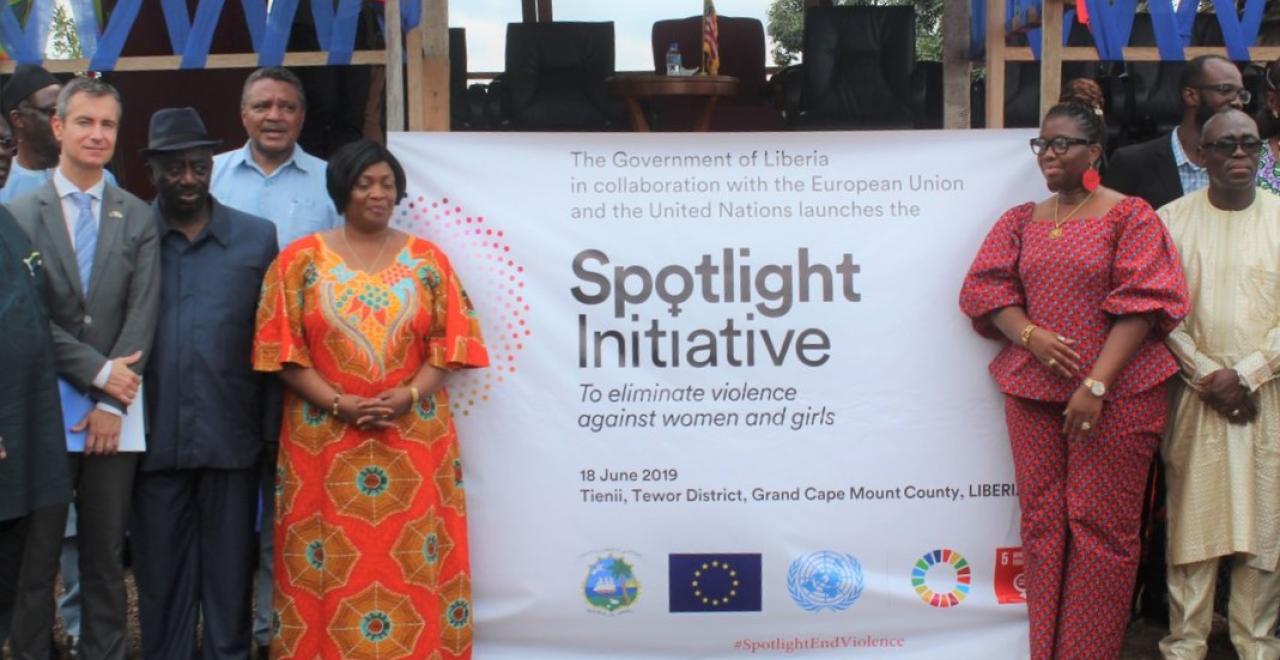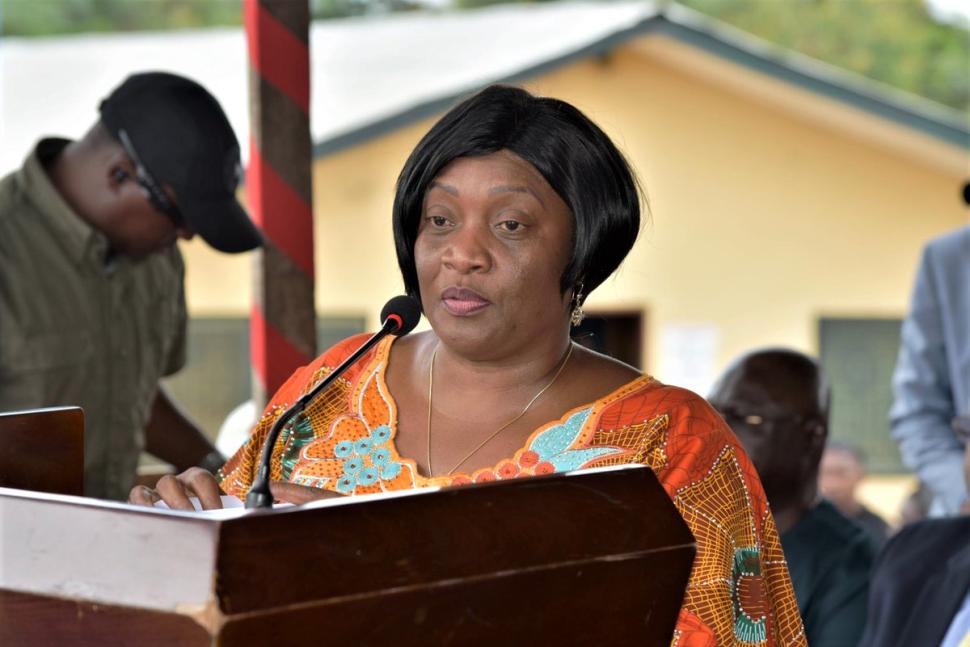Spotlight Initiative launched in Liberia

Tienii, Liberia - The Government of Liberia, the United Nations, the European Union, religious and traditional leaders and civil society launched Spotlight Initiative to eliminate violence against women and girls including sexual and gender-based violence and harmful practices.
Developed in close collaboration with national and local civil society organizations, the four-year €16 million investment will reinforce existing programmes to improve violence prevention, advocate for legislation and policies, develop institutional capacity, provide quality services, strengthen data collection and strengthen women’s rights movements for 600,000 people across five counties in the country.
“Our attitudes, customs and laws must be changed for the betterment of our nation.” - Vice President of Liberia Jewel Taylor
Liberia has high rates of reported violence against women and girls. In 2018, more than 2,000 cases of gender-based violence were filed with authorities. More than 60 per cent of these cases were classified as rapes. These numbers do not capture the true state of the violence women and girls face as many more cases are not reported or are settled out of court.
The launch event for the Initiative was held in the Tewor District of Grand Cape Mount County on 18 June 2019. More than 600 dignitaries, leaders and members of the community attended the event.
“Gender inequality is the root cause of the violence faced by women and girls,” said Vice President of Liberia Jewel Taylor, who delivered keynote remarks on behalf of President George Weah. “Our attitudes, customs and laws must be changed for the betterment of our nation.” She mentioned that Executive Order 92 on female genital mutilation would be extended and that the Domestic Violence Bill would be passed, removing two major legislative hurdles hampering efforts to end violence against women and girls in Liberia.
Chairman of the National Traditional Council of Elders and Chiefs, Chief Zanzan Kawar, stated that because of the Spotlight Initiative, traditional and community elders have pledged to end cultural and traditional practices that are harmful to women and girls. “The statistics on violence are not new to us. We have heard them before,” said Chief Kawar. “But today, we are saying enough is enough,”
United Nations Resident Coordinator Yacoub El Hillo, and the Head of the Political Section of the European Union Delegation to Liberia Juan Antonio Frutos highlighted that the Initiative’s success lies in the implications of all stakeholders of the Liberian society.
“The Spolight Initiative creates space for all in society to play an active role in ending violence against women and girls,” said United Nations Resident Coordinator Yacoub El Hillo. He also noted the importance of having traditional leaders play and active role and show their support for the Initiative as they are “a powerful segment of Liberian society.”
“The Spolight Initiative creates space for all in society to play an active role in ending violence against women and girls.” - United Nations Resident Coordinator Yacoub El Hillo
The launch culminates a year-long multi-stakeholder process of co-designing a comprehensive gender-based violence elimination programme in Liberia. “We are happy to say that we have been involved in the entire design process and programme development,” said a representative from civil society. “We are excited to implement the Initiative.”
“The real work starts now,” said European Union Delegation to Liberia Head of Political, Information and Communication Section Juan Antonio Frutos Goldaratz. “There is no time to lose. The Spotlight Initiative will need the government’s leadership to succeed in its implementation.”
For media inquiries, please contact:
In Monrovia: Chencho Gyalmo Dorjee, chencho.dorjee@one.un.org
In New York: Koye Adeboye, koye.adeboye@un.org
Background
Violence against women and girls is one of the most widespread and devastating human rights violations globally. In sub-Saharan Africa, the situation is worrisome.
Gender-based violence: In some countries in the region, 76 per cent of women have experienced physical and/or sexual violence in their lifetime. Most affected are marginalized women and girls facing multiple and intersecting forms of discrimination. In Liberia, A total of 2,105 cases of sexual and gender-based violence (SGBV) were reported in 2018, an increase of 420 cases from 2017.
Harmful practices: 15 of the 20 countries with the highest rates of child marriage are in Africa, and more than 40 per cent of girls marry before the age of 18. Every year, three million girls from 29 African countries join an estimated 200 million women and girls that have experienced the human rights violation known as female genital mutilation .
Sexual and reproductive health: The region also has the highest rates of unmet family planning needs, adolescent pregnancies, maternal deaths and HIV/AIDS prevalence.
Sexual and gender-based violence, harmful practices and barriers to sexual and reproductive health access have many commonalities. They share root causes and have similar challenges.
The Initiative will address legislative and policy gaps, strengthen institutions, promote gender-equitable attitudes, and provide quality services for survivors and reparations for victims of violence and their families.
Interventions will also strengthen systems for collecting data on violence against women and girls and empower women’s movements.

